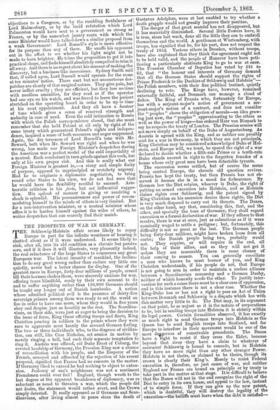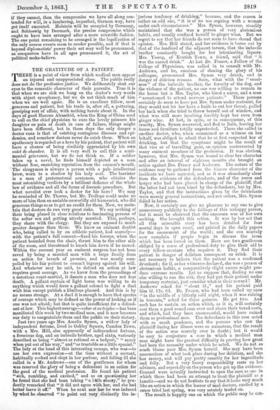THE PROSPECTS OF WAR IN GERMANY.
THE Schleswig-Holstein affair seems likely to repay Europe in part for the infinite weariness of hearing it chatted about as if it were understood. It seems likely to sink, after all, into its old condition as a chronic but passive sore, and if it does it will illustrate, very pleasantly indeed, the real reluctance of the large States to commence any great European war. The latent insanity of mankind, the inclina- tion to do any great wrong rather than endure any little one quietly, never had a better chance for display. One of the greatest races in Europe, forty-four millions of people, armed till their harness chokes them, were sincerely anxious for war, offering taxes blindfold, ready by their own account to do and to suffer anything rather than 150,000 Germans should be taught any longer out of Danish hornbooks. A nation whose admitted political evil is the presence of thirty-five sovereign princes among them was ready to set the world on fire in order to have one more, whom they would in five years obey and despise just as heartily as the rest. The Scandina- vians, on their side, were just as eager to bring the decision to the issue of force, King Oscar offering troops and fleets, King Christian pouring in soldiers to the points where they were sure to aggravate most keenly the aroused German feeling. The two or three individuals who, to the disgrace of civiliza- tion, can still, like Czar Nicholas, set armies in motion by merely ringing a bell, had each their separate temptation to ring it. Austria was offered, vic1 Duke Ernst of Coburg, the coveted headship of Germany, the Prussian King saw a chance of reconciliation with his people, and the Emperor of the French, annoyed and affronted by the rejection of his recent proposal, signified that France had no concern in the matter. If Germany liked to extend he had nothing to object to exten- sion. Jealousy of one's neighbours was not a sentiment Frenchmen could ever feel ! England, though wroth to the last degree at the apparent breakdown of diplomacy, was as reluctant as usual to threaten a war, which the people did not desire, the statesmen would rather avert, and the Crown simply detested. It really appeared as if Germans and Scan- dinavians, after living almost in peace since the death of Gustavus Adolphus, were at last enabled to try whether a death grapple would not greatly improve their position. The danger of that great scandal has not disappeared, but it has materially diminished. Several little Powers have, it is true, since last week, done all the little they can to embroil themselves and the world. A gentleman at Wurtemberg, with troops, has signified that he, for his part, does not respect the treaty of 1852. Various others in Dresden, without troops, have also explained that they think the agreement ought not to be held valid, and the people of Hanover have been peti- tioning a particularly obstinate King to go to war at once. The Prussian Chamber of Deputies has voted by 231 to 63, that " the honour and interests of Germany demand that all the German States should support the rights of Prince Frederick to the Duchies of Schleswig and Holstein"— the Polish members, with their fine political instinct, quietly declining to vote. The Kings have, however, remained externally faithful, and Denmark can manage a cloud of dukes. The King of Prussia who, fortunately for Europe, has with a serjean.t-major's notion of government a ser- jeant-major's notion of a contract, and does not consider the " peoples " above the obligation of morals—an idea grow- ing just now, the " peoples " . approximating to the ethics as well as the power of kings—has ordered Herr von Bismark to say he respects the treaty of London. The Prussian armies will not move simply on behalf of the Duke of Augustenburg. As Austria is agreed with the King, and as neither can possibly wish for a war in Germany, in which they are not principals, King Christian may be considered acknowledged Duke of Hol- stein, and Europe will, we trust, be spared the sight of a war declared to decide whether a fifth-rate Prince or a tenth-rate Duke stands nearest in right to the forgotten founder of a. house whose only great men have been detestable tyrants. if they cannot, then the compromise we have all along con- tended for will, in a lumbering, imperfect, German way, have got itself executed. Holstein will be occupied by Germany, and Schleswig by Denmark, the precise compromise which ought to have been arranged after a more scientific fashion. The one point remaining to be arranged is the legalization of the only course events seem to render possible, and if that is beyond diplomatists' power their art may well be pronounced, as conquerors have in all ages pronounced it, the art of political make-believe.































 Previous page
Previous page